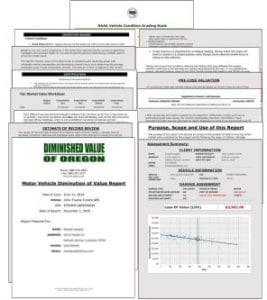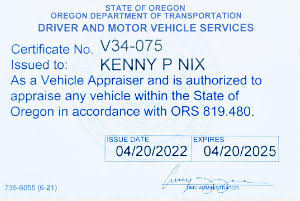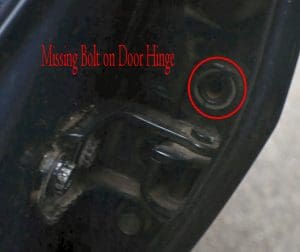Diminished Value Appraisals – They’re Different?
Determine if they are Licensed in Oregon.
When searching for an auto appraiser to produce your diminished value appraisal in Oregon, it’s crucial to ensure that they are certified to perform appraisals in the state. Out-of-state appraisal companies often target Oregon due to the state’s long history of diminished value claims, dating back to the 1940s. Therefore, it’s essential to do your research and choose a certified appraiser who is knowledgeable about the unique nuances of Oregon law and regulations.
It is state law, ORS 819.482¹, that the auto appraiser must be Oregon Certified. A person commits the offense of acting as a vehicle appraiser without a certificate if the person does not hold a vehicle appraiser certificate issued under ORS 819.480 (Vehicle appraiser certificate) and the person, for consideration, issues an opinion as to the value of a vehicle. If you have someone who does not hold an Oregon Vehicle Appraiser Certificate produce your diminished value appraisal, it may be denied by the insurance company and even in a court of law.
Here’s my license:
Determine if they have the right experience.
It’s common for auto appraisers to lack actual experience in determining the overall value of a vehicle, especially if they come from automotive areas where overall valuation is not used. We’ve encountered appraisers who claim to have produced tens of thousands of appraisals, only to find out that they did so as estimators at an auto body shop and have no real knowledge of a vehicle’s overall value. In Oregon, someone with at least two years’ experience as an auto body estimator can obtain a vehicle appraiser’s license and be called an “appraiser.” However, it’s important to note that some individuals may falsely claim to have worked as an appraiser for decades when they’ve never determined the overall value of a vehicle before working on diminished value claims. It’s crucial to remember that diminished value is about the overall value of the vehicle, not just the cost of repairs.
Another type of appraiser we run into is the auto adjuster appraiser or the appraiser who works very closely with the insurance companies. Usually stating they have inside information and contacts to “beat the system”. Again, most have little to no actual previous experience valuating vehicles.
Determine who they may really be working for.
As mentioned above, they may state they used to work for an insurance company. Chances are pretty good, they still are. They may state they have to be unbiased. That’s balony. It’s because they’re making a lot of money producing appraisals for the insurance companies. Let me ask you a question. If you were a billion dollar insurance company and you were consistently hiring appraisers, would you hire the ones who produces the more favorable results more often or the honest appraisers who produced true values that may cost the insurance companies and their stockholders billions each year?
Just ask them if they’ve produced an appraisal for an insurance company in the past 60 days and how many have they produced for them in the last year.
Do they actually Testify?
Many DV appraisal companies have crazy terms for testifying. Many start charging $400.00 from the time they leave their office, until the time they get back. In Portland Traffic, that could easily cost you $1,200 to $2,500 just for a few minutes of testimony. Others may state there is a minimum of 4 hours at $400.00 and hour. With depositions as much as $5,000. Most of this is just so they can get out of testifying as many are afraid they’ll perjure themselves. I’ve testified in many different types of cases. Even Victim Restitution cases for the District Attorney.
Have Your Vehicle Repaired
In Oregon, you do not have to use the auto collision body shop that the insurance company recommends. If they try to make you, this is considered steering and is illegal in Oregon. Choose a reputable shop. I suggest not using a shop that has an insurance company representative on the premises as you may not be the person that the shop is trying to please.
Request OEM parts is possible. Beware, as the majority of auto body shops will have you sign paperwork stating they can use USED, Non-OEM and Aftermarket Parts on your car or truck without your permission. If required to sign anything, make sure to read the information carefully and if there is a clause allowing them to use USED, Non-OEM and/or Aftermarket Parts request that be taken out of the agreement.
Although many auto appraisers want you to contact them after the repairs have been completed, I highly suggest you contact your chosen appraiser ahead of time. Having an inspection before the repairs start can help the appraiser establish if there was a prior collision to your vehicle. In Oregon, an auto dealer can sell you a car with up to $1,000.00 in warranty cost repairs without having to disclose the repairs to you 2015 ORS 650.155¹. This could translate to thousands of dollars in retail repair costs. I’ve seen this many times where the owner has no clue their car was previously damaged and it can severely affect how quickly and for how much you can settle for.
If you don’t want to have an appraiser involved yet, I advise you to take as many pictures of the vehicle immediately after the loss as possible. Photograph the front, rear, sides, inside trunk, engine, tires/wheels, odometer, vin plate, the seats, headliner and carpets. You never know when you’re going to be in another accident or if the car or truck can be damaged at the collision center while your repairs are in process.
Once your vehicle has been repaired, have someone other than yourself look closely at the repairs. Are the gaps uniform? Are they pinched or wider in spots? Are there bolts or nuts that have broken paint? I’ve found many bad repairs as I inspect vehicles over the years including:
- Fraudulent repairs where a shop states they did something on the estimate, but they didn’t.
- Bad repairs such as Orange peel, dirt in paint, bad welds, not applying paint or corrossion resistant finishes or seals.
- Improper determination of repairs, such as missing parts that were damaged.
Prepare Evidence of Your Loss of Value.
 In Oregon, the burden of proof is on you. This normally means that you have to supply evidence that you have actually lost value and not been made whole. There are several ways you can establish that you have suffered a loss of value, including preparing evidence yourself. Although, we don’t advise it, as it may appear bias. Most insurance companies will request that you submit a diminished value appraisal from an independent auto appraiser licensed in the State of Oregon. There are many appraisal firms online including appraisers who receive the majority of their work from the insurance companies, similar to insurance companies’ “preferred repair shops”.
In Oregon, the burden of proof is on you. This normally means that you have to supply evidence that you have actually lost value and not been made whole. There are several ways you can establish that you have suffered a loss of value, including preparing evidence yourself. Although, we don’t advise it, as it may appear bias. Most insurance companies will request that you submit a diminished value appraisal from an independent auto appraiser licensed in the State of Oregon. There are many appraisal firms online including appraisers who receive the majority of their work from the insurance companies, similar to insurance companies’ “preferred repair shops”.
 There are companies who advertise heavily and may produce poor quality reports that may not establish credible evidence. Most are “arbitrary” values based on the car appraiser’s opinion. Unlike Real Estate Appraisals produced in Oregon, that must follow USPAP standards, there is no specific law that states that an auto appraiser must follow any standards when preparing their appraisal. Because of this, sometimes we see very low quality DV reports that fail to produce any legitimate evidence to prove a claimant’s diminution of value.
There are companies who advertise heavily and may produce poor quality reports that may not establish credible evidence. Most are “arbitrary” values based on the car appraiser’s opinion. Unlike Real Estate Appraisals produced in Oregon, that must follow USPAP standards, there is no specific law that states that an auto appraiser must follow any standards when preparing their appraisal. Because of this, sometimes we see very low quality DV reports that fail to produce any legitimate evidence to prove a claimant’s diminution of value.
The better the appraisal, the better the chance of the insurance company accepting the credibility of the appraisal and paying the claim faster and for more money. Just because a company prepares the appraisal the same day or within 24 hours of the assignment, doesn’t mean you’re going to receive a faster settlement. Normally the opposite happens. Insurance companies come up with new objections monthly, the more objections addressed in the appraisal, the better the chances that the objection can easily be overcome instead of becoming a reason for the insurance company to make a low offer or even denial. Which, could cause you to go to court or arbitration instead of settling quickly and easily.
Submitting your claim if under $10,000.00
You now have to submit a demand with the attached evidence of your loss of value to the at-fault driver or their insurance company. We supply sample demand letters with our appraisals. In Oregon, the recipient of a demand has 30 days to reply with a “Best Offer” under ORS. 20.080. This ordinance states:
(1) In any action for damages for an injury or wrong to the person or property, or both, of another where the amount pleaded is $10,000 or less, and the plaintiff prevails in the action, there shall be taxed and allowed to the plaintiff, at trial and on appeal, a reasonable amount to be fixed by the court as attorney fees for the prosecution of the action, if the court finds that written demand for the payment of such claim was made on the defendant, and on the defendant’s insurer, if known to the plaintiff, not less than 30 days before the commencement of the action or the filing of a formal complaint under ORS 46.465 (Time and place of hearing), or not more than 30 days after the transfer of the action under ORS 46.461 (Counterclaims). However, no attorney fees shall be allowed to the plaintiff if the court finds that the defendant tendered to the plaintiff, prior to the commencement of the action or the filing of a formal complaint under ORS 46.465 (Time and place of hearing), or not more than 30 days after the transfer of the action under ORS 46.461 (Counterclaims), an amount not less than the damages awarded to the plaintiff.
(2) If the defendant pleads a counterclaim, not to exceed $10,000, and the defendant prevails in the action, there shall be taxed and allowed to the defendant, at trial and on appeal, a reasonable amount to be fixed by the court as attorney fees for the prosecution of the counterclaim.
(3) A written demand for the payment of damages under this section must include the following information, if the information is in the plaintiff’s possession or reasonably available to the plaintiff at the time the demand is made:
(a) In an action for an injury or wrong to a person, a copy of medical records and bills for medical treatment adequate to reasonably inform the person receiving the written demand of the nature and scope of the injury claimed; or
(b) In an action for damage to property, documentation of the repair of the property, a written estimate for the repair of the property or a written estimate of the difference in the value of the property before the damage and the value of the property after the damage.
(4) If after making a demand under this section, and before commencing an action, a plaintiff acquires any additional information described in subsection (3) of this section that was not provided with the demand, the plaintiff must provide that information to the defendant, and to the defendant’s insurer, if known to the plaintiff, as soon as possible after the information becomes available to the plaintiff.
(5) A plaintiff may not recover attorney fees under this section if the plaintiff does not comply with the requirements of subsections (3) and (4) of this section.
(6) The provisions of this section do not apply to any action based on contract. [Amended by 1955 c.554 §1; 1979 c.525 §1; 1981 c.897 §1; 1981 c.898 §19; 1985 c.342 §7; 1985 c.618 §15c; 1997 c.46 §2; 1999 c.947 §1; 2001 c.542 §2; 2009 c.487 §§1,3]
If the insurance company makes an offer that is acceptible to you, you’re done.
If not, you may choose to file a lawsuit against the at-fault driver. This may be decided in Arbitration, Court, or out of Court.










